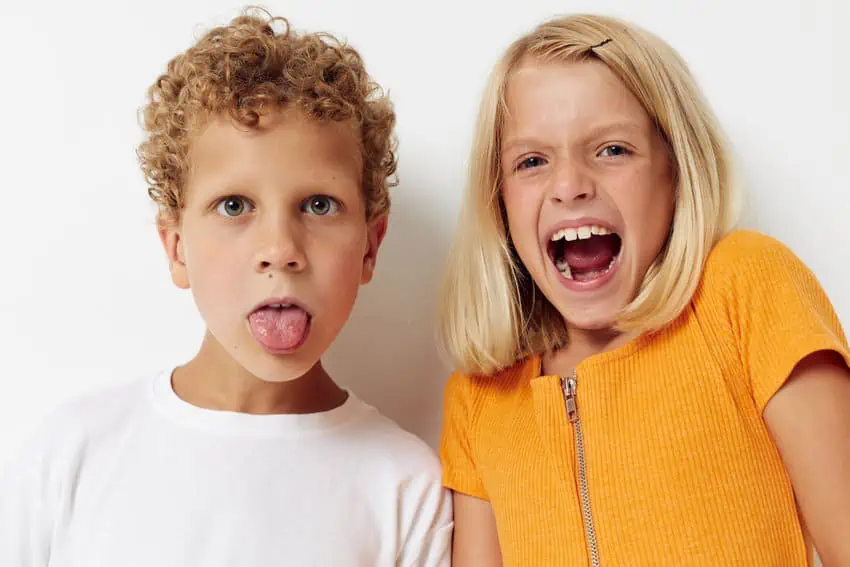Inside: What exactly is going on inside the brain of a tween? Help tweens navigate this time of transition with these practical parenting tips.
Parents with younger kids always hear something along the lines of, “Cherish it while you can. They grow up so fast!” And while you do have many years with your adoring child, kids turn into tweens sooner than you may think!
While not quite the dreaded teenage years, there are lots of physical, social, and emotional changes your child will go through as a tween. You’ll notice your relationship change as a parent. Before, your kid would beg you for cuddles and bedtime stories, and now, you might have to learn their favorite video game just to spend time with them.
As a parent, you need to find the fine line between accepting your tweens’ newfound sense of freedom and still being their parent during these formative years.
Let’s dive into the secrets of the tween brain and how you can still connect and help them through their tween years!
What is a Tween?
Tween is a term that applies to the pre-adolescence years for children. Oftentimes, it’s also referred to as the preteen years. Regardless of the name, it’s a loose categorization for kids aged 8 or 9 to age 12.
During this time, kids are quickly approaching puberty. Some may even be there already! They’re changing physically, emotionally, and, most importantly, cognitively. Tween behavior can change drastically from one day to the next.
Neither a child nor a teenager, tweens have a growing sense of independence but still need their parents’ support. Every child goes through the tween years differently, which is why you need to adapt and listen specifically to your tween’s behavior!
Inside the Tween Brain
While the physical changes are right in your face when it comes to your tween, their brain can remain a little bit more of a mystery. Your tween is experiencing a huge shift in the way they think.
Previously, all they really knew to focus on was themselves and their needs and wants. Now, they’re transitioning from a more self-centered point of view to becoming more aware of how others think. They’re even able to identify their own thoughts better.
This means children are going to think more about how they’re perceived. They will want to fit in and will often compare themselves to others. They become more empathetic as to what’s happening to others and learn to see opinions and values outside of their own. Because of this newfound sensitivity to the world around them, their emotions also become heightened.
As they become more aware of others, they begin to identify more with friends rather than family. You may find your child turning away from you more and relying on peers.
Tips for Parents Navigating Tween Behavior
So what is a parent to do with all of these big changes? First of all, it’s not as scary as it may seem! There’s plenty you can do to keep both you and your child happy in your relationship and day-to-day life.
Help with decision making
With tweens, there’s a fine balance between letting them make their own decision and helping them. On one hand, they want more independence (and they should be getting some). On the other hand, they’re still very young and need support and guidance from their parents for all facts of life.
As parents, we need to guide them toward making the right decisions (tough mistakes do happen!) and avoid making the decisions for them. Teaching your kids how to evaluate pros and cons is an easy thing for tweens to grasp.
Together, work through all kinds of ideas they may present to you. This can be as simple as deciding what to wear or something bigger like how to deal with a friend.
Helping lay out all the options and consequences of each will allow them to make their own right decision.
Be a good role model
Your tween is becoming more and more aware of the world around them, and for perhaps the first time, they will really see your behavior. They’re going to notice the way you talk about other people, how angry you get when things don’t go your way, or even the kinds of things you’re interested in. Their brains are absorbing this all as cues for their own tween behavior.
If you want your child to act a certain way, you need to model your behavior for them. This can include:
- Interactions with strangers
- How to handle your own emotions
- The way you speak to one another
- How you view and take care of yourself
Set aside time together
While your child may be getting more and more independent, it doesn’t mean they never want to hang out with you anymore. It’s always important to have family time, no matter the age of your children. This helps to strengthen your bond and allows you time to communicate openly and without force.
Each parent should have one-on-one time with each child. This should be a time when your tween has your undivided attention. To make it more special for your child, try to do something they love.
Another great way to get more family time together is through family meetings. This helps everyone stay connected as a family, hash out important plans, openly communicate about any issues, and also have fun and spend time together as a family.
Promote positive self-esteem
While there’s more going on in the brain than we know, we can see the physical changes in our children. At the tween age, everyone’s bodies look different. Some may already be entering puberty, while others are far from it.
Some tweens can see extreme growth spurts during this time. This can allow kids to feel awkward and clumsy in their “new” bodies. It’s more important to focus on how their changing bodies are affecting them on the inside through their self-esteem.
Tweens will constantly be comparing themselves to their peers, and they’re also being targeted in the media. Society will tell them exactly how a girl and boy should look and act, and it can be tough to ignore all of this just as you’re figuring out who you are yourself.
For boys, society wants to drill compassion, love, and sensitivity out of them. It’s important to foster this vulnerability in them at home. Encourage them to continue to talk about their feelings with you and keep communication channels open.
Girls, meanwhile, are sexualized at a very young age and told that they need to look a certain way. Encourage them to love themselves as they are as much as possible. It’s also a good idea to monitor social media use and remove any unhealthy influences or look for signs of distress from your tween online.
Watch for signs of bullying
Another response to changing bodies and trying to fit in is the rise of bullying. All of these physical and cognitive changes mean that the tween age is when bullying becomes more prevalent. Some tweens grow in confidence, while others grow in awkwardness. This can result in a change in the social hierarchy at school.
Once again, monitor social media for signs of any concerning behavior.
Encourage their changing self-identity
You’ll begin to see your teens becoming mini-mes of their future selves. But they’ll also have to do a lot of experimenting to get there. While kids will be trying to fit in, you’ll also see them trying to figure out who they want to be.
As they become more aware of the self, they will begin to change not only their behaviors but even things like their interests, how they talk, what they wear, who they hang out with, what they watch, and more.
Give them the freedom to make these choices and go through the phases of what they like and don’t like. One second, they might be into the trampoline and want to take gymnastics classes, and the next thing you know, they want to buy a skateboard instead. Experimenting with these interests will help them figure out who they will become.
As a parent, you’re going to have to learn to relate to them differently. Try to do these activities together when you can but also let them have fun on their own.
Help them with school
The shift from elementary to middle school is a major one. As students, they are also granted a lot more autonomy and are allowed to explore their individual interests more.
The shift to middle school also means more homework than you or your kid is used to! It’s a good idea to set up good study habits now and a regular routine to ensure a smoother transition into their teenage and high school years.
The addition of extracurriculars like piano lessons, soccer practice, or scouts may mean things might get a little hectic. Try to balance out as many of their new interests as possible while also keeping stress levels to a minimum. We don’t want our tweens to be little balls of stress already!
The takeaway
All in all, things are changing for both you and your tween. It’s going to be an adjustment, but just remember to listen to them, love them, and help them when they need you. The tween years will fly by!
Want even more?
Shop All Parenting Resources
Shop all of our parenting resources from self-regulation tools and managing big emotions to building self esteem and confidence. There are resources for all seasons of life!









